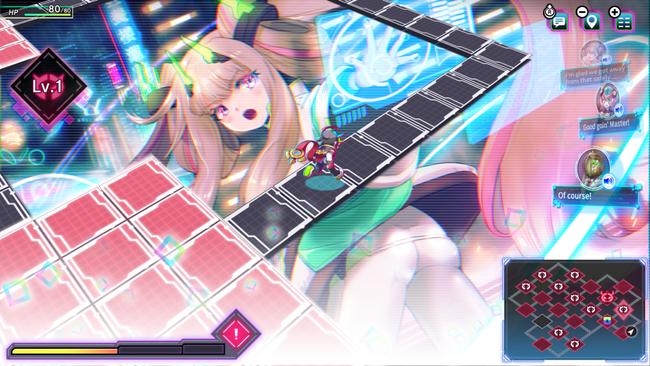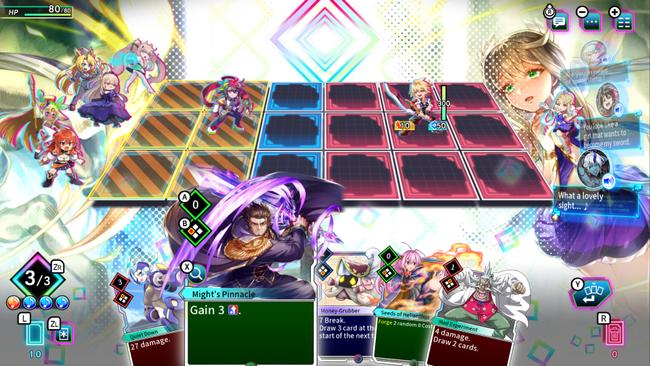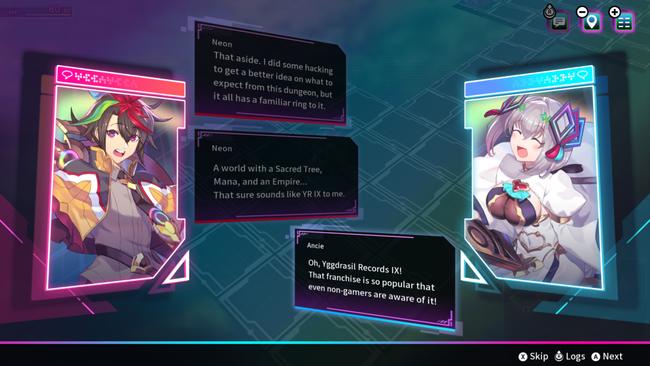
Card-en-Ciel Review
While demos can give you a strong first impression for a game, they really are no substitute for playing the full game for yourself; perhaps more than any other game I've reviewed recently, Card-en-Ciel feels emblematic of that core truth. While Card-en-Ciel's gameplay makes it more than worth giving a shot, the overall package leaves a lot to be desired.
Most of what I have to say about the gameplay remains the same as it did for the demo during Anime Expo; Your core gameplay loop revolves around your cards, which are used for both actions and movement. During battles, enemies will count down to their next attack; and it's your goal to deal whatever damage you can or whittle down their defenses while staying out of the way of any incoming attack by the time you retire your turn. What makes this tricky comes down to how different cards will have different costs to use, and different directions that they'll let you move if you willingly discard them. Your goal is to try and break the enemy's guard to deal as much damage as possible in one turn; how you get to that point, however, will come down to the strengths and weaknesses of each individual deck.

Every turn you'll only have a limited number of energy to use cards; certain deck setups can make it easier to use whatever you want with enough prep, but at the end of the day you'll be getting nowhere without carefully planning your next moves, and considering what you have available to you with whatever deck you're running for a particular mission. Each level, which is ostensibly themed after a specific game - either one that actually exists in Inti-Creates catalog, or one that's been made specifically for this game's storyline and doesn't yet exist in reality - tends to give you cards that help teach you how to play a specific archetype of deck. I would go as far as to say that these levels are essentially tutorials in disquise, especially since your deck is reset with every level with the exception of a singular muse card you're given to play around with at the start of the stage.
Muses are the glue that holds Card-en-Ciel's gameplay together; there are specific prerequisites to activating them, and upon doing so you can quickly buff your cards in ways that suit the playstyle that these muses represent. Upon activating a muse, you also gain access to a charge to activate one of your cards sub-abilities; whether that's a version of the card with greatly increased stats, the ability to clone itself multiple times, or more. There's a ton of different playstyles to consider by the end of the game, with systems like Convert, Break Points, Forging cards and much more meaning that each deck you're taught how to play does genuinely feel very different from the last. However, it does make it especially clear that these stages are essentially glorified tutorials.

There's nothing wrong with this, of course. But beyond every level essentially teaching you how to play a specific deck, there's very little that sets each stage apart - even though they're supposed to be you diving into each game world. Dungeons aesthetically look the same; regular enemies look the same, with only stronger units that have set themselves on the map offering any sort of visual variety. Truthfully, there is no actual story involved with these missions; merely a quick explanation of what the game is supposed to be at the start, and a very short exchange with the main characters of the game world at the end of the stage. It gets old fairly quickly, especially when the story in-between these levels doesn't leave any stronger a first impression.
In-between missions, the story revolves around Neon, the "Gamer Chair Detective" who investigates crimes within different VR games and worlds, and Ancie, his assistant who reached out to him in order to help solve the problem of MODs - data from other games leaking across into other game worlds, and eventually the real world. However, the story is completely threadbare - and the relationship between Neon and Ancie being the cornerstone of it all feels weightless when you're given no time to get to know either of them. It clearly feels like fanservice with Ancie is meant to be the cornerstone of the story. If you're looking for that, sure, but I can't deny that I'm disappointed that it feels like so little effort was put into the overall storyline.

I didn't get the chance to test multiplayer, which feels like it may have been far more of a focus for the game than I'd have originally thought; but in terms of what else you can do in single player, you'll gain resources you can expend to permanently buff things like Neon's HP, and the chance for rare cards and modifiers to appear during levels. Beyond that, after every few stages you'll gain access to a Grand Battle dungeon to cap a section of the story. These are the same as regular stages, with one core difference; your deck is comprised of every card you've ever picked up, including muses, and your HP is determined by the number of cards in your possession. Other than that, they're mostly the same - though with the sheer number of muses in your possession by the end game, these dungeons become more of a nuisance than something to be enjoyed. It's very easy for things to slide out of control once you activate one muse, which can then cause a chain reaction where a dozen more are activated in short succession. While entertaining the first time, it can get old really fast; and enemy stats, the HP you'll have to cut through and the Break you'll have to inflict to their Balance in order to get them in a position where your cards can be most effective.
While individually Card-en-Ciel's decks offer a fun and engaging time as you learn to play around them, if anything Grand Battle dungeons seem emblematic of the game's own worst flaws. Inti-Creates had a great idea for a gameplay system, and it's charming to see them use their own IPs as fodder for the cards to populate these systems - but at the end of the day, it feels like they simply didn't know how to design a full game around the system they'd envisioned. Card-en-Ciel isn't a bad game by any means, but you can very much feel the limits of what the team could deliver; maybe the gameplay will be enough to make it worth your while, but it's hard to give a strong recommendation when so much of the experience feels disjointed and threadbare.